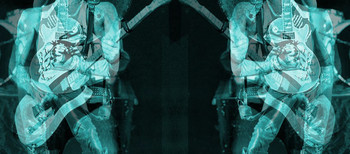
Or how the initially reluctant manager of the world’s most incalcitrant rock and roll band out-maneuvered Mick Jagger.
Alan Niven the manager of Great White (yes, the band that set light to a nightclub in Rhode Island resulting in the death of a 100 people, long after he’d given up being their manager) was propositioned by Geffen Records to manage the Guns N’ Roses. The band had signed with Geffen in March 1986, receiving a $75,000 advance, which was half of what they’d been offered by Chrysalis Records.
Tom Zutaut, the A&R at Geffen who had signed GNR, asked Niven three times to talk with the band with a view to managing them. At the first instance, Niven turned him down because he was dealing with getting Great White re-signed after they’d been dropped by their label. The second time Zutaut came to him, he was obviously having difficulties and receiving multiple refusals from other potential managers including being turned down by Tim Collins (Aerosmiths’ manager) Niven did some research on GNR and said thanks but no. The third time Zutaut confessed he was seriously in trouble, Rosenblatt President of Geffen was about to drop the band and Zutaut about to be fired and would Niven rescue him. The band had already spent $75,000 and had nothing worthwhile recorded. The band was proving impossible to organize or deal with.
https://www.youtube.com/watch?v=ORzDd6FLac0
At this time GNR were being managed half-heartedly by Rod Stewarts’ management and were desperate to escape its clutches. Niven thought the band was rough edged and was skeptical about radio’s response but considered them a potentially great underground rock and roll band.
Finally (after Zutaut’s third beseechment) Niven visited the band at their house and the first thing he sees is a smashed toilet outside the front door, and a notorious stripper leaving the building. Slash introduced Niven to his pet snake, and Niven was scared of snakes. Axl barely spoke and Izzzy was nodded out.
Niven had two priorities. Extracting the band from prior relationships and getting them to show up at rehearsals for what would become the 1987 Appetite for Destruction recording sessions.
The album was released in July of ’87 and with its single “Welcome to the Jungle” it stalled in terms of sales and chart position for over a year until David Geffen himself pitched the video of the single to MTV CEO Tom Freston. MTV played the video at 4:00 in the morning in the graveyard shift, which very quickly started a brushfire with fans. The MTV switchboard lit up and the video was added into the rotation. The second single “Sweet Child o’ Mine” drove the album home to become a huge hit during the summer of 1988.
In 1989 Niven received an offer that Guns N’ Roses should be the support act for the Rolling Stones “Steel Wheels” tour. The offer was for $50,000 per show. Jagger reportedly was responsible for the choice reasoning that GNR were on their way up and would help the Stone’s ticket sales enormously. While the exposure might make sense, Niven reasoned that the band could make double that easily headlining their own tour. In the midst of discussions, the Stones announced four shows at the LA Coliseum in GNR’s hometown (a 75,000 seater venue at $30 average price per ticket) When it was leaked to the press that GNR would be on the bill, the LA Times called Niven to confirm and he denied the rumor, informing Jagger via intermediaries that GNR would not tour with the Stones. Jagger’s office called Niven with an offer to have GNR play four nights in LA for $500,000 and Niven countered with a demand for $1,000,000, which would be more than if they had played the entire tour at $50,000 per night, without the strain of travelling and staying away from home. The Stones had always relied on opening acts to boost their street credibility and to sell more tickets and hired such acts like Prince, Janis Joplin, the J. Geils Band, the Meters, Santana, and Lynyrd Skynyrd. Niven figured that with the rumors abounding, GNR had already boosted the Stone’s credibility in the LA market and he gambled that it would be a win for the band. History doesn’t relate
whether GNR knew all of the machinations behind the negotiation but they were collectively and individually psyched to work the same stage as their heroes the Rolling Stones. Jagger’s office accepted the million dollar fee and GNR were billed to appear between the Stones and the opening act Living Color who were riding the charts with their debut album “Vivid.”
The Rolling Stones “Steel Wheel” tour lasted into the following year in Japan without GNR, and re-established them as a huge commercial success rewarding them with over $175 million in the United States alone. The Rolling Stones, formed in 1962, had sold 240 million albums worldwide and the 1985 formed Guns N’ Roses have sold over a 100 million records worldwide, including 45 million in the United States – not too shabby for a support act starting 23 years later!
Conrad W.
